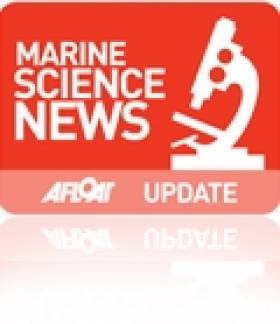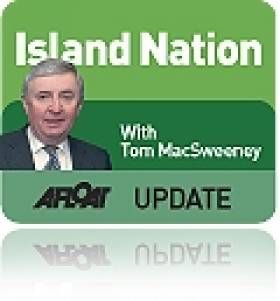Displaying items by tag: marine research
Irish Lead Mission to Find New Life on the Ocean Floor
An Irish-led marine research mission has set off to discover strange new lifeforms that inhabit the deepest parts of our oceans.
In collaboration with scientists from the UK’s National Oceanography Centre, the team sailed from Galway earlier this week bound for the Mid-Atlantic Ridge to investigate life at 3,000m below the surface of the sea.
Using a remotely operated vehicle (ROV) they will explore for the first time the 45o North MAR hydrothermal vent field, where vents spew mineral-rich seawater heated to boiling point in the earth’s crust. These are home to a rich variety of marine life that thrives in complete darkness on bacteria fed by chemicals.
Patrick Collins from NUI Galway’s Ryan Institute will lead Ireland's marine biological team investigating this unique ecosystem, which could tell us not only about how life might have evolved on other planets, but may also be a rich source of new biochemical processes with valuable medical and industrial applications.
"There is potential here to put Ireland on the global map as a serious player in deep sea science," said Collins. "This is all the more timely with the exploitation of deep sea and hydrothermal vents for precious metals and rare earth minerals now a reality.”
The mission carries geochemists, marine biologists, marine geologists, marine geneticists and technicians from Ireland and the UK as well as a three-person TV crew from National Geographic.
They will spend 25 days at sea and will be posting a regular blog on scientistsatsea.blogspot.com.
Giving Away a Billion from the Sea
I had to read the figures twice to make sure that I was seeing them correctly. The second reading made me even more angry than the first.
They were, at last, a definitive figure of how much the stupidity of Irish politicians and the ignorance and disregard of the maritime sphere by the Government have cost this nation – over a billion Euros in one year.
There is no way the Government can weasel its way out of this revelation, nor any excuse the un-named civil servants responsible can make to avoid the accusation that this is a massive economic waste.
The Marine Institute is the Government's own respected authority on maritime affairs, the voice of the State on marine research and it has valued the total available catch of fish off Ireland last year at €1.18 billion, for a total of 994,155 tonnes.
That is an enormous figure, indicating huge potential wealth for this cash-strapped nation in the middle of an economic disaster. But of this total value of seafood, Ireland was only entitled to catch €0.19 billion. Foreign fishing fleets had exclusive rights to take the rest of the fish from Irish waters.
No wonder I had to read the figures a second time to make sure I was seeing them correctly at a time when the value of our food exports has been shown to be one of the top earners for the nation. How much more could have been earned if Irish fishermen could catch all that fish and have it processed in Ireland, creating onshore jobs in ancillary businesses as well as at sea?
The total value for 2010 could be even higher than €1.18 billion because the Institute prepared its figures in advance of the annual fisheries negotiations in Brussels in December. Ireland as a nation and the country's fishing industry in particular are likely to have lost out even more heavily to other EU countries.
Effectively, Ireland handed over around €1billion of its natural economic resources to other EU countries. Mark McCarthy, Editor of The Marine Times, the national fishing industry paper, described the figures as "truly frightening."
"This is a nation with some of the richest fishing grounds in the world where the coastal communities are being financially starved and frustrated through their inability to catch their own fish, because they are not allowed to do so."
It is hardly any wonder that Irish fishermen, forced to tie up their boats at the quaysides of Irish fishing ports and watch as foreign vessels unload into those ports, are bitter and frustrated.
Ebbie Sheehan of Castletownbere, Chairman of the Irish Fishermen's Organisation, asks why fishermen are "so badly treated when we look at the economic situation today?"
The Marine Institute, our national maritime scientific and research organisation, says that its estimate of the value of fishing opportunities in Irish waters is "conservative" and that, in order to prepare the figures in early December, it based them on 2009 values
That would make the total value even higher and the Institute pointed out that of the total catch of 994,155 tonnes, Ireland's fishermen were entitled to take only 18 per cent of the catch. This was only 16 per cent of the total value.
"These figures exclude valuable inshore fisheries, such as lobster and whelk which are not currently managed by total allowable catches within the Common Fisheries Policy," the Institute pointed out.
As Mark McCarthy described it, when one considers the importance of using our natural resources for the benefit of Irish people and the failure of our political leaders to see and understand this, what has been revealed is "truly frightening".
- This article is reprinted by permission of the EVENING ECHO newspaper, Cork, where Tom MacSweeney writes maritime columns twice weekly. Evening Echo website: www.eecho.ie






























































